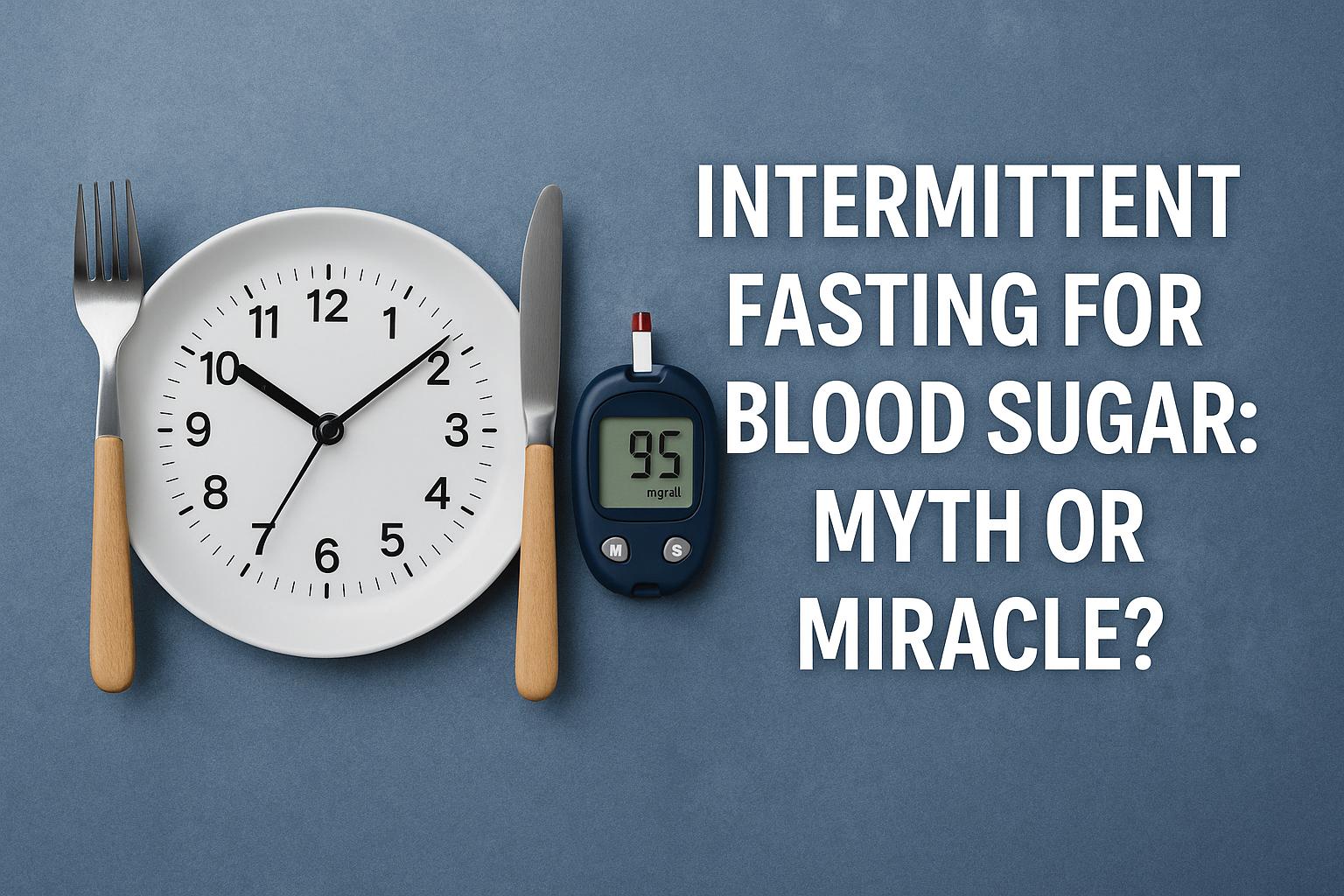Intermittent Fasting for Blood Sugar: Myth or Miracle?

Strong 8k brings an ultra-HD IPTV experience to your living room and your pocket.
In the realm of health and wellness, intermittent fasting (IF) has gained popularity because to its purported advantages, which range from improved concentration to weight loss. Its effect on blood sugar levels, however, is one advantage that has recently drawn a lot of attention and is more potent than most people know.
✍️ Intermittent fasting is one of the most popular trends in recent years. Our weight loss guide explains the science behind fasting windows, its benefits, and how to avoid common mistakes beginners make.
Is intermittent fasting a true blood sugar-control miracle or is it just another health fad that has been overhyped on social media? Let's dissect it using logic from everyday life, science, and simplicity. This information could impact your life, regardless of whether you have prediabetes, want to lose a few pounds, or are simply interested in how your body functions.
What is Intermittent Fasting?
Intermittent fasting isn’t a diet—it’s a pattern of eating. You cycle between periods of eating and not eating (fasting). What makes it unique is that it doesn’t focus on what you eat, but when you eat.
Common methods include:
- 16:8 method: Fast for 16 hours, eat within an 8-hour window (e.g., 12 pm to 8 pm). This is the most popular and sustainable method for beginners.
- 5:2 method: Eat normally for 5 days, and reduce calories to about 500-600 for 2 non-consecutive days.
- Eat-Stop-Eat: 24-hour fast once or twice a week, which is a bit more advanced but can show quick results.
The idea is to give your body a break from constantly processing food, especially carbs and sugar, allowing your insulin levels to drop and fat-burning hormones to kick in. It’s a more intuitive way of eating that aligns better with how humans evolved to consume food.
How Blood Sugar Works?
Your body uses glucose, or blood sugar, as its main energy source. Your blood sugar rises when you eat, particularly when you eat carbs. Your pancreas responds by releasing insulin, which aids in the absorption of that sugar into your cells.
The issue occurs when your blood sugar is consistently elevated, which is typically brought on by eating a lot of sugary meals or processed carbohydrates. This may eventually result in weight gain, insulin resistance, and type 2 diabetes.
Insulin resistance means your cells stop responding well to insulin, so your body pumps out even more to manage the sugar. That excess insulin keeps your body in fat-storage mode, making it nearly impossible to lose weight.
How Intermittent Fasting Affects Blood Sugar
1. Reduces Insulin Levels
When you fast, your insulin levels naturally drop. Lower insulin means your body is better able to access stored fat and prevent constant fat storage. Studies show intermittent fasting may improve insulin sensitivity, especially in overweight individuals. This makes it easier to burn fat and stabilize blood sugar.
2. Improves Fasting Blood Sugar
Research has shown that people who practice IF may experience a reduction in their fasting blood glucose levels. That’s a big win, especially for prediabetics or those with metabolic syndrome. Better fasting glucose means your body is efficiently using and storing energy.
3. Lowers Inflammation
Chronic inflammation often goes hand in hand with blood sugar issues. IF may help lower markers of inflammation, which can indirectly help stabilize blood sugar. Less inflammation also means better heart health and lower risk of chronic diseases.
4. Promotes Weight Loss
Excess weight (especially around the belly) is closely tied to insulin resistance. IF helps shed fat and improve metabolic health, which supports more stable blood sugar. And the best part? Many people find they eat less without even trying.
Common Myths About IF and Blood Sugar
Myth 1: Fasting Causes Blood Sugar to Crash
Truth: If you’re generally healthy, short-term fasting won’t cause hypoglycemia (low blood sugar). However, diabetics or those on insulin should consult their doctor before trying IF.
Myth 2: You Need to Eat Every Few Hours to Keep Blood Sugar Stable
Truth: This idea was popularized in the fitness industry, but newer research shows that less frequent eating (with the right balance of nutrients) can be just as effective—if not better—for stabilizing blood sugar. Constant grazing can actually do more harm than good.
Myth 3: IF is Only for Weight Loss
Truth: While weight loss is a common benefit, many people use IF for improved focus, reduced inflammation, digestive rest, and better blood sugar regulation. It's about metabolic healing—not just dropping pounds.
Who Should Be Cautious with IF?
- People with diabetes (especially on medication)
- Pregnant or breastfeeding women
- Those with a history of eating disorders
- Individuals with adrenal or thyroid issues
Always talk to a healthcare professional before starting IF if you fall into any of these categories. Safety first.
Tips to Get Started with IF (Safely)
Start slow: Begin with a 12:12 fasting-eating window and gradually increase to 16:8.
Stay hydrated: Drink plenty of water, herbal teas, or black coffee during fasting.
Focus on whole foods: When you eat, prioritize balanced meals with protein, healthy fats, and fiber.
Avoid binging: Don’t overeat when your eating window opens. This can cancel out the benefits.
Listen to your body: Lightheaded? Moody? Maybe IF isn’t for you—and that’s okay.
Stay consistent: Like any lifestyle shift, results come with time and commitment.
Final Thoughts
So, in terms of blood sugar, is intermittent fasting a myth or a miracle?
It's not magic, of course, but it's also not a myth. If used properly, IF can be a very powerful technique for enhancing insulin sensitivity and controlling blood sugar. It is supported by research and actual outcomes.
The most effective strategy? Intermittent fasting should be combined with a diet high in nutrients, frequent exercise, and a long-term health-promoting lifestyle. It's about development and consistency, not perfection. You must try Glucoberry supplement.
Note: IndiBlogHub features both user-submitted and editorial content. We do not verify third-party contributions. Read our Disclaimer and Privacy Policyfor details.







